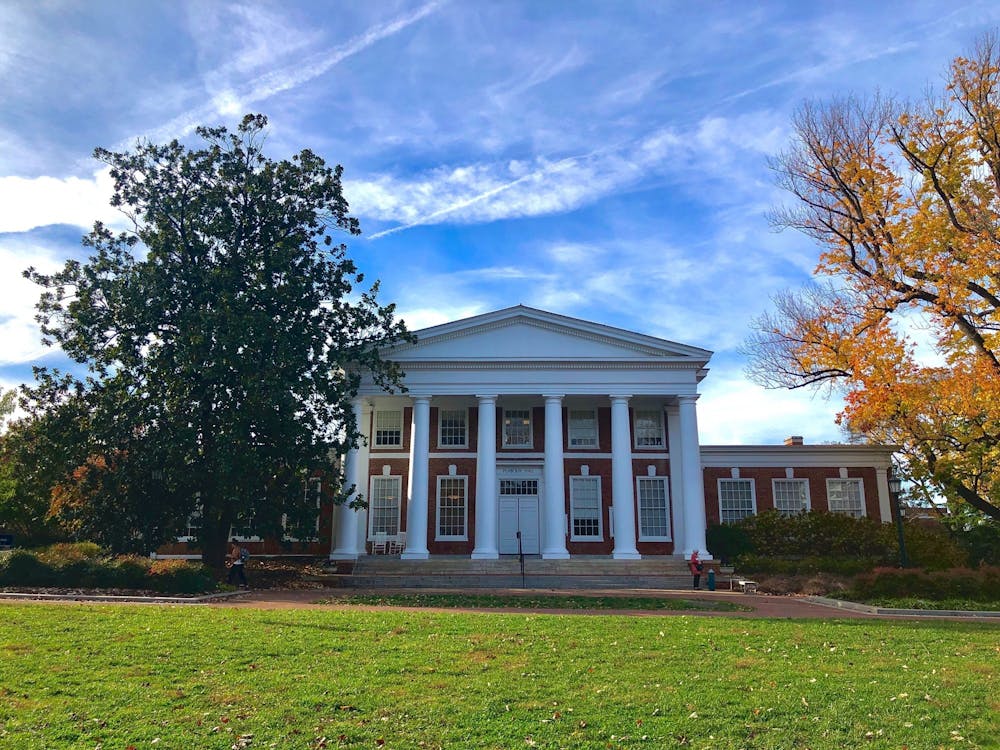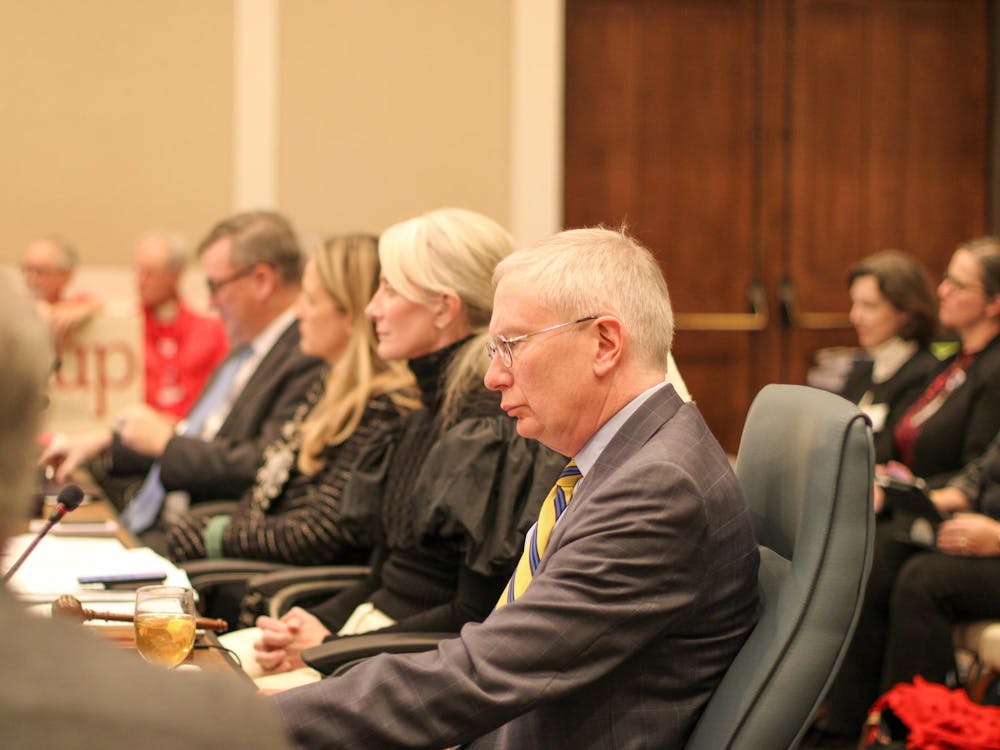Following the University’s termination of the University Guide Service’s Special Status Organization agreement Wednesday, the Guide Service will shift to focus solely on historical tours — rather than admissions tours — according to Jack Giese and Davis Taliaferro, Guide Service co-chairs and fourth-year College students.
“Over the past few years, the mission of sharing our university's history has really taken a front seat in our organization,” Giese said. “We're interested in exploring ways that we can also share the student experience with prospective students, but I do think history will be the focus.”
Special Status Organizations are student-run organizations which are authorized by the University to act on its behalf. Prior to the start of the 2024-25 academic year, the Guide Service had provided both admissions and historical tours to prospective students and community members, respectively.
After the University suspended both admissions and historical tours at the beginning of the Fall 2024 semester, the Guide Service collaborated with the Office of Admissions to improve admissions tour quality through a performance improvement training plan but had not received feedback from the University regarding how or when historical tours would be reinstated. In response, the Guide Service began conducting historical tours independently of the University in January.
According to Giese, the Guide Service had anticipated that a termination of the special status agreement could happen this year. He cited this as a reason that the Guide Service chose to conduct tours independently from the University prior to the termination.
“One of the biggest reasons that we started giving historical tours independently is because we were worried they would do something like this and then we would have the rug pulled out from under us as an organization,” Giese said. “I think that this development has kind of validated that decision in many ways.”
Taliaferro said that they will continue to have conversations with members about whether to go fully independent or become a Contracted Independent Organization — student groups which offer educational, service or social opportunities for members but do not act on behalf of the University. Taliaferro did note that either decision would not have a large impact on the Guide Service.
“It won't really impact how we operate with the rest of the University,” Taliaferro said. “The CIOs are already independent in many ways. There's some pros to that. [There are] also some pros to being fully independent. We’ll weigh that, [but] the full outcome won't be too significant.”
As the organization prepares for this new era, Taliaferro said that general body members of the Guide Service are frustrated but looking forward to the future. He also noted that recruitment for new members has continued to be successful and that he believes the Guide Service has a strong group of students who are passionate about their mission.
“We're really frustrated and upset with how this entire process went,” Taliaferro said. “But at the same time, we're really energized, because what we do has so much value. We're excited to have some clarity … to know the next steps we need to take to continue to fulfill our mission, and now we have the flexibility and a lot less stress from administration.”
Giese also said that he was optimistic about the future of the Guide Service and noted that independently conducted historical tours, which began Jan. 24, have seen a high amount of interest over the past month.
In response to the University’s offer that the Guide Service could attempt to reestablish its SSO agreement after the 2025-26 academic year, Taliaferro encouraged future leadership to consider how the organization functions independently and the administrative environment when this time comes.
In a meeting with Guide Service leadership Wednesday, Vice Provost for Enrollment Stephen Farmer cited a lack of member participation in the admissions tours training plan as the reason for the termination. According to Giese, 62 members began the process but only 15 completed the training plan. Farmer’s statement also noted that 15 Guide Service members had completed this process. Giese said that he believed this was due to the intensity of the plan and scheduling conflicts which made it difficult for members to attend all training sessions.
“I was going through this process, I could not finish, and I would have had to skip class to finish,” Giese said. “I know that that's the case for many guides. It's not the case for many guides as well, but I know many guides had other commitments that prevented them from fully finishing this plan.”
The plan required members to attend about 12 hours of training sessions, rewrite their tours and have a tour shadowed by staff in the Office of Admissions, according to Taliaferro. He also said that many Guide Service members became disillusioned with the process throughout the semester, as they felt the University’s promise to reinstate tours upon completion of the plan became less clear as time went on.
Taliaferro did note that from the beginning of the performance improvement plan, they had been aware that if University administrators were not satisfied with results, termination would be taken into consideration.
When the suspension first happened in fall 2024, the University voiced concerns about comprehensiveness and reliability of admissions tours, Giese said that the Guide Service had not received feedback on historical tours since the suspension, despite repeated efforts at communication. He shared that the University’s main reasoning provided for the extended historical suspension was administrators’ concerns over delegating the sharing of the University’s history solely to a student organization.
In a written statement to The Cavalier Daily, Farmer made a similar statement and said that the responsibility of telling the University’s history should be shared more broadly across the community. Farmer shared that the University is currently working with faculty to develop a self-guided tour, a process they also hope to include students in.
Farmer’s statement also said that Guide Service members have declined repeated invitations to collaborate on this self-guided tour. According to Giese, he and Taliaferro felt that they could not agree to work on this tour without a commitment from the University regarding when sanctioned student-led historical tours would be reinstated.
“Frankly, what we've been telling [the University] for four months is that we would love to help with [the self-guided tour],” Giese said. “[But only] if we have a firm commitment on what the position of our organization will be in the future. We're not going to work on our replacement.”
This spring, individual members of the Guide Service sponsored a University-wide referendum which will be included on the ballot in upcoming student elections. The referendum calls for the University to reinstate sanctioned historical tours and condemns the University for its actions towards the Guide Service. Taliaferro and Giese said that they have not discussed this referendum with administration but that they do not believe it is what caused the University’s decision to terminate their SSO agreement.
The referendum will remain on the ballot in March. Giese said that although the language may be outdated since the termination, he still sees it as an opportunity to gain understanding of general student support for the Guide Service.
“[The termination] makes us glad that we put [the referendum] up to the students,” Giese said. “I think it's important for us to know whether students stand behind our mission … It does get at a core question of, ‘do you think that having [autonomous] student voices being the ones telling the story of this University is important?’ and I'm excited to see what the result of that will be.”
Taliaferro also shared that he felt the organization would succeed with or without University support and that he is looking forward to the future.
“[It’s] something that's really valuable, that there's a group of students willing to talk about how much they love this school for free, and that's something that the administration lost,” Taliaferro said. “It's sad right now to look at this group of people I care so much about and what's happened to us, but I also know … that this organization will undoubtedly be okay, and I'm looking forward to what we can do now.”







